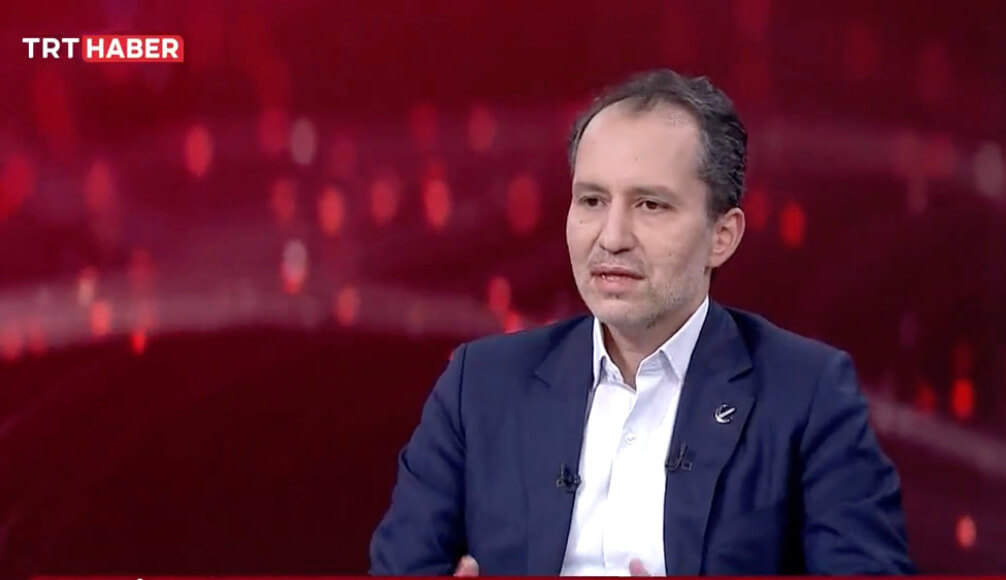A small opposition party led by the son of a former prime minister has announced its decision to join an alliance with Turkish President Recep Tayyip Erdoğan’s party shortly after declining the invitation, the state-run Anadolu news agency reported.
As Turkey heads toward presidential and parliamentary elections on May 14, election alliances are expanding with the addition of new parties.
Fatih Erbakan, leader of the New Welfare Party (YRP), announced on Friday that his party would join the Public Alliance, which includes the ruling Justice and Development Party (AKP), the far-right Nationalist Movement Party (MHP) and the nationalist Grand Unity Party (BBP).
It was a change of mind on the part of YRP Chairman Erbakan, who earlier the same week said he would run as a presidential candidate himself rather than support another candidate and that his party would not take part in any election alliance.
Erbakan’s U-turn came after his prospects of collecting 100,000 signatures to be able to qualify as a candidate in the election looked dim in the first days of signature collection, which began on March 22 and would end on March 27.
By the third day Erbakan had collected 70,000 signatures. If a person is not nominated by a political party that received at least 5 percent of the nationwide vote in the latest election, they need to secure at least 100,000 signatures from supporters to be able to run as a presidential candidate in the election.
Erbakan said he had concluded the application process with the Supreme Election Board (YSK) and that his party had reached an agreement on the issues they demanded from the AKP.
A statement from the YRP said the AKP and the YRP signed an agreement as a part of which the AKP will make an effort to meet the YRP’s demands concerning social life, economy and foreign policy if it comes to power.
There were claims that the YRP, which has a conservative voter base, submitted a wish list of 30 items to the AKP which included a demand for the repeal of a law for the prevention of violence against women as a condition for joining Erdoğan’s political alliance.
Meanwhile Erbakan, who spoke to the state-run TRT Haber over the weekend about his party’s decision to join the Public Alliance, said the YRP had changed its mind because of its belief that the opposition bloc will not be beneficial for the country due to its support for several groups that his party finds problematic. Erbakan accused the opposition Nation Alliance of being pro-outlawed Kurdistan Workers’ Party (PKK) as well as favoring the Gülen movement, socialism, communism, atheism and the LGBTI community.
The Gülen movement, which is accused by the Turkish government of masterminding a failed coup in July 2016, is also labeled by the government as a “terrorist” organization. The movement strongly denies both charges.
Fatih Erbakan is the son of the late former prime minister Necmettin Erbakan, a leading figure of Turkey’s Islamist movement who had formed the Welfare Party (RP) in 1983. Erdoğan started his political career in the RP but in 2002 decided to part ways with Erbakan and the “conventional” Islamist movement and established the AKP along with former president Abdullah Gül.
The radical Islamist Free Cause Party (HÜDA-PAR), the political arm of the Kurdish Hizbullah, has also joined the Public Alliance. AKP Deputy Chairman Ali İhsan Yavuz announced over the weekend that the AKP had decided to support HÜDA-PAR candidates in some regions but did not reveal on how many deputies they had reached agreement.
The fact that Erdoğan has sought the support of small opposition parties that do not even have 1 percent of the nationwide vote has led to allegations that Erdoğan feels his 20-year-rule is under serious threat.
An increasing number of opinion surveys show Erdoğan lagging behind Kemal Kılıçdaroğlu, leader of the main opposition Republican People’s Party (CHP) and the presidential candidate of an opposition bloc of six parties.
Erdoğan’s popularity has suffered mainly due to the erosion of the standard of living caused by depreciation of the Turkish lira and runaway inflation.
The government’s poor response to two powerful earthquakes in the country’s south last month that claimed more than 50,000 lives and left millions homeless has also contributed to Erdoğan’s loss of support.
